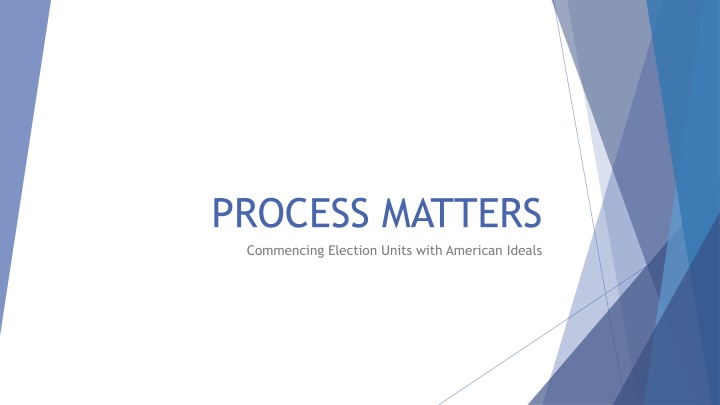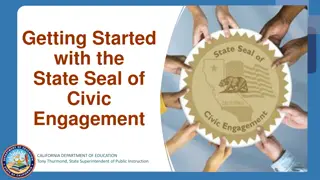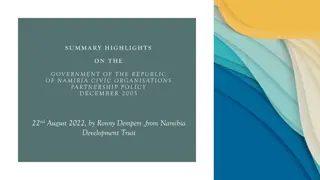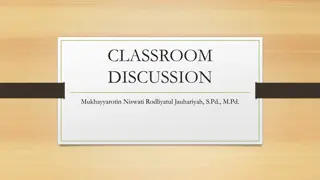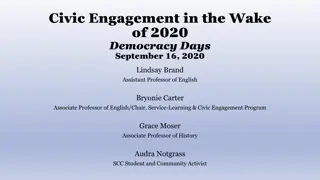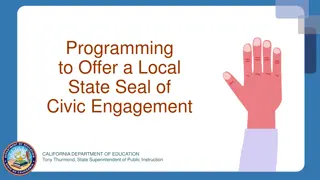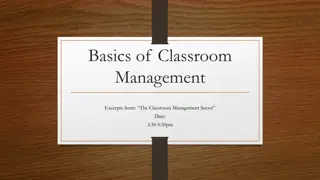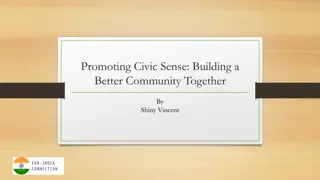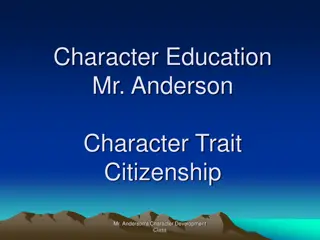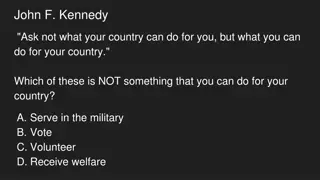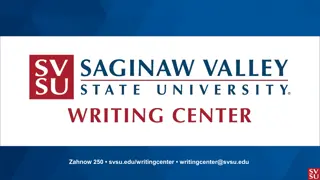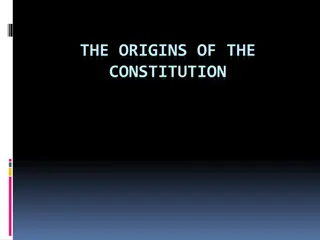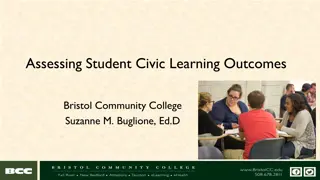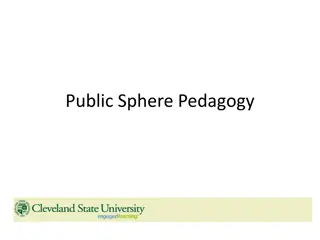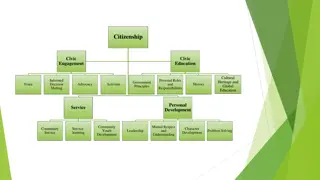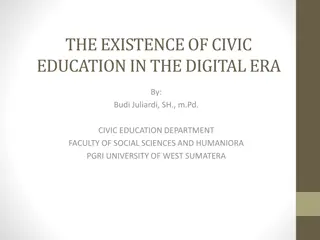Nurturing American Ideals in Civic Education for Classroom Discussions
Emphasizing American ideals in civic education can provide a non-partisan foundation for teaching about elections, fostering civil discourse, and maintaining a positive school environment. By focusing on founding documents and unity, teachers can guide students towards civic literacy and meaningful inquiry, while safeguarding classrooms from external pressures.
Uploaded on Sep 25, 2024 | 0 Views
Download Presentation

Please find below an Image/Link to download the presentation.
The content on the website is provided AS IS for your information and personal use only. It may not be sold, licensed, or shared on other websites without obtaining consent from the author.If you encounter any issues during the download, it is possible that the publisher has removed the file from their server.
You are allowed to download the files provided on this website for personal or commercial use, subject to the condition that they are used lawfully. All files are the property of their respective owners.
The content on the website is provided AS IS for your information and personal use only. It may not be sold, licensed, or shared on other websites without obtaining consent from the author.
E N D
Presentation Transcript
PROCESS MATTERS Commencing Election Units with American Ideals
The Problems Facing Teachers How to teach about elections during a highly partisan era. How to ensure civil discourse within the classroom, and a positive school and classroom climate. How to protect the classroom from outside partisan pressures. How to emphasize that which unites us as Americans. How to ensure students are civically literate.
Rationale for Commencing with American Ideals American ideals are a source of unity for a diverse nation and provide an important context for civic education. Focusing on American ideals places valid parameters on classroom discussions, rather than opening classroom discussions to random statements potentially disruptive of the school climate. Basing instruction on American ideals in founding documents (especially the Constitution) provides a non-partisan basis for responding to any outside advocacy or pressure groups. It is crucial that instruction be non-partisan. American ideals can form the basis for inquiry-based lessons and provide a reference point for questions and discussions during the year that can be revisited. It can facilitate the infusion of civic education across the curriculum.
Possible Inquiry Questions - President What ideals best define and unite us as Americans? The president swears a solemn oath to uphold the Constitution. Each candidate hopes to take this oath on January 20, 2017. What ideals does he/she implicitly agree to defend and uphold? Which candidate best articulates these ideals? The oath: I do solemnly swear (or affirm) that I will faithfully execute the office of President of the United States, and will to the best of my ability, preserve, protect, and defend the Constitution of the United States. What other ideals from our founding documents should the president uphold?
Possible Inquiry Questions - Congress What ideals best define and unite us as Americans? The Constitution (Article VI, clause 3) requires that members of Congress swear a solemn oath to uphold the Constitution. Each candidate hopes to take this oath on January 3, 2019. What ideals does he/she implicitly agree to defend and uphold? Which candidate best articulates these ideals? The oath: I do solemnly swear (or affirm) that I will support and defend the Constitution of the United States against all enemies, foreign and domestic; that I will bear true faith and allegiance to the same; that I take this obligation freely, without any mental reservation or purpose of evasion; and that I will well and faithfully discharge the duties of the office on which I am about to enter: So help me God. What other ideals from our founding documents should members of Congress uphold?
New Jersey State Elections Oaths of Office If you are teaching a state election, you may wish to reference these oaths: Governor: "I, , elected governor of the state of New Jersey, do solemnly promise and swear that I will diligently, faithfully and to the best of my knowledge, execute the said office in conformity with the powers delegated to me; and that I will to the utmost of my skill and ability, promote the peace and prosperity and maintain the lawful rights of the said state. So help me God. Legislators: Legislators must take the following oath of allegiance, prescribed by the Constitution, before taking office: I do solemnly swear (or affirm) that I will support the Constitution of the United States and the Constitution of the State of New Jersey, and that I will faithfully discharge the duties of Senator (or member of the General Assembly) according to the best of my ability. In addition, members must take an oath of office as follows: I do solemnly swear (or affirm) that I will faithfully, impartially and justly perform all the duties of the office of according to the best of my ability. So help me God. The oaths have been combined and are administered at the first session of each newly elected House, and when necessary to seat a new member selected to fill a vacancy on an interim basis or elected to fill a vacancy on a permanent basis. *Note that in the governor s oath the pledge to uphold the Constitution and the New Jersey Constitution is implied rather than explicitly stated.
The Process First Inquiry: Guiding the class to the inquiry and supporting questions regarding ideals. Brainstorming the concept of ideals. Interpreting documents (in this case, the Constitution) and locating ideals. Presenting, critiquing, and defending conclusions on ideals, developing a class consensus. Second Inquiry: Guiding class to inquiry question regarding which candidate best articulates and supports the identified American ideals from the Constitution he/she will swear to uphold. Interpreting documents and candidate statements, comparing candidates to ideals. Stating and defending conclusions.
Notes It may be necessary to define what is meant and expected by the term ideals . Students may confuse these with practices and policies. Ideals can be defined as those values and principles that are the ultimate goal or aim of our founding documents and institutions and which define the best of America. For example, limited government is an ideal, checks and balances is a practice that makes that possible. Democracy is an ideal, voting is a practice to realize democracy. Rule by law is an ideal, establishing a system of courts is a practice. Once ideals are listed, and before narrowed down to the best or most important five or six, expect to dedicate class time to the precise definition of the terms (ex. What is really meant by liberty ?) Identifying ideals should precede any discussions of government, the electoral process, the candidates, or other controversial issues.
Possible Ideals This is a list of ideals that teachers came up with during a recent exercise. You may come up with different ones. Democracy Liberty (negative conception) Limited Government Equality Of opportunity, both political and economic Equal protection under the laws Property Rights
